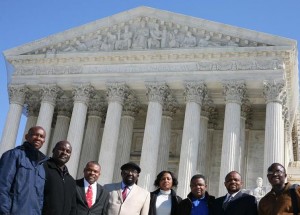On Tuesday, November 9, 58 private security companies signed an International Code of Conduct for Private Security Providers. The signatories included major U.S. based firms, such as Triple Canopy, DynCorp, EODT, and even Xe (formerly known as Blackwater). The Code seeks to address the human rights impact of security providers and among its standards are rules for the use of force, prohibitions on child and forced labor, human trafficking, torture and other cruel, inhuman and degrading treatment, and commitments regarding the vetting and training of personnel and the reporting of incidents of the use of force.
The participants reflect a multi-stakeholder group representing governments, companies and their trade associations, civil society groups, and experts and academics, many of whom were involved in the 14 month process to develop the Code facilitated by the Geneva Centre for the Democratic Control of Armed Forces. This Code initiative is distinguishable from other voluntary efforts to date to create standards for companies in that its goal is to have the clients of private security providers – both governments and non-state clients like humanitarian aid organizations and other companies – include requirements to adhere to the Code in their contract vehicles.
The British government has already committed to making this a requirement for its contracted security, and the U.S. government is currently contemplating doing the same according to U.S. Department of State legal advisor Harold Koh. This would lend these voluntary standards some real teeth, as the human rights commitments made by the signatory firms could be upheld in courts of law. Furthermore, it represents an important advancement in the recognition by a global industry of the obligations of firms to uphold human rights wherever they operate.
However, the credibility of this initiative will hinge on the nature of the external independent mechanisms for effective governance and oversight. OMB Watch and some non-governmental organizations have warned of the shortcomings of any mechanism of reporting the incidents of the use of force that relies on self-reporting. Humans rights groups, such as Human Rights Advocates, Right Respect, and other human rights groups have endorsed the Code, but warn that the Code not be viewed as a substitute for the development of binding legal instruments to ensure that private security firms are held accountable for their actions.
SEE THE REST OF THIS POST




